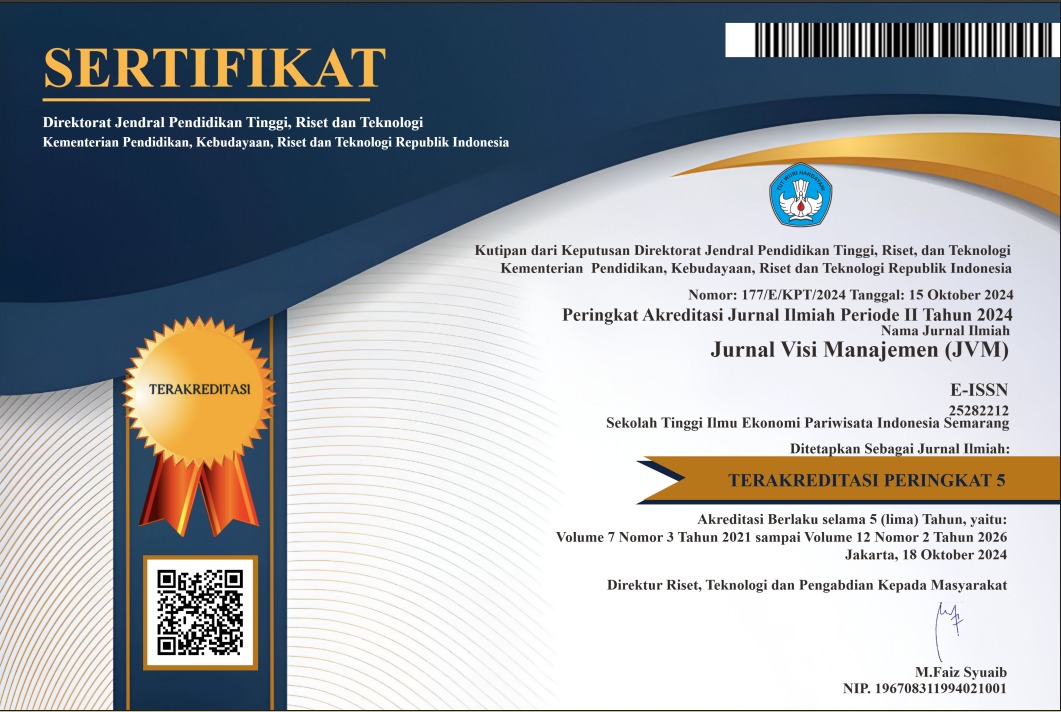Dinamika Peran Human Resources Business Partner (HRBP) dalam Mendrive Strategi Bisnis : Studi Kasus pada Perusahaan Sektor Finansial di Indonesia
DOI:
https://doi.org/10.56910/jvm.v11i2.868Keywords:
Business Strategy, Company, Financial Sector, HR, HRBPAbstract
This study aims to explore the dynamics of the role of Human Resources Business Partners (HRBPs) in driving business strategy, with a focus on identifying challenges and supporting factors for their implementation in the Indonesian financial sector. The study employed a descriptive qualitative approach with a case study method. Data were collected through in-depth interviews with several HRBPs and line managers in financial sector companies, supported by observation and document analysis. The collected data were analyzed thematically. The results revealed three main challenges faced by HRBPs: (1) resistance to change within the HR function itself, (2) limited analytical and business competencies within HRBPs, and (3) a lack of understanding of the strategic role of HRBPs among line managers. Furthermore, the success of the HRBP role is strongly supported by three key factors: full support from top management, quality collaboration with line managers, and the use of information technology for efficiency and data analysis. This study provides practical guidance for companies, particularly in the financial sector, to optimize the strategic role of HRBPs through competency development programs, organizational culture change, and technology support. This research provides an in-depth empirical overview of the actual practices and complexities of implementing the HRBP model in the Indonesian context, a topic rarely explored.
References
Bennett, N., & Lemoine, J. (2014). What VUCA really means for you (SSRN Scholarly Paper No. 2389563). Social Science Research Network. https://papers.ssrn.com/abstract=2389563
Burlyka, I. (2024). Human resource business partners and their role in servicing information technologies related technical assessments. https://elib.bsu.by/handle/123456789/318735
Cooper, J. (2024). From HR model to contextual system: An exploration of how the HR function is organised and the factors that influence the organising of HR. Cranfield University. https://dspace.lib.cranfield.ac.uk/handle/1826/22666
Creswell, J. W., & Creswell, J. D. (2018). Research design: Qualitative, quantitative, and mixed methods approaches (5th ed.). Sage Publications Ltd. https://sim.uniqhba.ac.id/assets/upload/ebook/Research_Design_Qualitative,_Quantitative,_and_Mixed_Methods_Approaches_(John_W._Creswell_J_._David_Creswell)_.pdf
Enderes, K. (2024). It is time for HR business partner 2.0. Strategic HR Review, 23(6), 234-237. https://doi.org/10.1108/SHR-07-2024-0050
Häll, A. (2025a). Lost in translation: The human resource business partner in a Scandinavian context. Nordic Journal of Working Life Studies. https://doi.org/10.18291/njwls.148116
Häll, A. (2025b). Lost in translation: The human resource business partner in a Scandinavian context. Nordic Journal of Working Life Studies. https://doi.org/10.18291/njwls.148116
Haochen, Z. (2025). A study of the impact of HRBP competency model on employee satisfaction: A case study of CLIMAVENETA Company.
Haryanto, I. (2025). Organizational performance: Analysis of the role of spiritual leadership, GHRM, and organizational support. Jurnal Ekobistek, 14(2), 125-132. https://doi.org/10.35134/ekobistek.v14i2.938
Junyan, G., Luying, W., & Razak, M. R. bin A. (2024). Research on the application of HRBP model in Chinese enterprises. International Journal of Academic Research in Economics and Management Sciences, 13(1). https://doi.org/10.6007/IJAREMS/v13-i1/19983
Khusna, K., Mirzania, A., Muhsyi, A., & Fauziyyah, S. (2022). Analisis kompetensi human resource business partner (HRBP) dalam mencapai kesuksesan organisasi perguruan tinggi. Journal of Business & Applied Management, 15(2), 125-132. https://doi.org/10.30813/jbam.v15i2.2691
Mancia, D. A. e L. (2024). Business partner de recursos humanos: The hub. Saint Paul Editora.
Maseme, T. L., & Saurombe, M. D. (2025). Perceptions of how spiritual leadership enhances connectedness in blended teams. SA Journal of Human Resource Management, 23(1), 2958. https://doi.org/10.4102/sajhrm.v23i0.2958
McCracken, M., O'Kane, P., Brown, T. C., & McCrory, M. (2017). Human resource business partner lifecycle model: Exploring how the relationship between HRBPs and their line manager partners evolves. Human Resource Management Journal, 27(1), 58-74. https://doi.org/10.1111/1748-8583.12125
Pradipta, B. C., & Sugiarto, A. (2024). Achieving social entrepreneurship sustainability through the development of human resource business partner competency. Jurnal Maksipreneur: Manajemen, Koperasi, Dan Entrepreneurship, 13(2), 581-594. https://doi.org/10.30588/jmp.v13i2.1621
Saefullah, A., Gustiawan, W., Kuraesin, A. D., Rahmawati, Nurasiah, & Moeljono. (2023). Human resource management functions in business sustainability: (Frozen food business case study). Upajiwa Dewantara: Jurnal Ekonomi, Bisnis Dan Manajemen Daulat Rakyat, 7(2), Article 2.
Saefullah, A., Hidayatullah, S., Fadli, A., & Candra, H. (2025). The impact of transformational leadership on energy innovation: A review from the viewpoint of the consumer. International Journal of Artificial Intelligence Research, 8(1.1), Article 1.1. https://doi.org/10.29099/ijair.v8i1.1.1357
Tsakila, N. F., Wirahadi, M. A., Fadilah, A. A., Simanjuntak, H., & Siswajanty, F. (2024). Analisis dampak fintech terhadap kinerja dan inovasi perbankan di era ekonomi digital. Indonesian Journal of Law and Justice, 1(4), 11-11. https://doi.org/10.47134/ijlj.v1i4.2787
Downloads
Published
How to Cite
Issue
Section
License
Copyright (c) 2025 Jurnal Visi Manajemen

This work is licensed under a Creative Commons Attribution-ShareAlike 4.0 International License.







